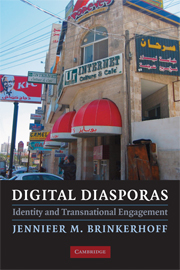Book contents
- Frontmatter
- Contents
- Tables and Figure
- Acknowledgments
- Digital Diasporas
- 1 Introduction
- 2 Diasporas, Identity, and Information Technology
- 3 Keeping the Dream Alive
- 4 Digital Diasporas as Cybercommunities
- 5 Digital Diasporas and Conflict Prevention
- 6 Policy Agendas, Human Rights, and National Sovereignty
- 7 Helping the Homeland
- 8 Digital Diasporas: A New Avenue for Peace and Prosperity?
- Appendix
- Acronyms
- Bibliography
- Index
1 - Introduction
Published online by Cambridge University Press: 05 June 2012
- Frontmatter
- Contents
- Tables and Figure
- Acknowledgments
- Digital Diasporas
- 1 Introduction
- 2 Diasporas, Identity, and Information Technology
- 3 Keeping the Dream Alive
- 4 Digital Diasporas as Cybercommunities
- 5 Digital Diasporas and Conflict Prevention
- 6 Policy Agendas, Human Rights, and National Sovereignty
- 7 Helping the Homeland
- 8 Digital Diasporas: A New Avenue for Peace and Prosperity?
- Appendix
- Acronyms
- Bibliography
- Index
Summary
The world after September 11, 2001, is a scary place. Many, already feeling powerless due to globalization, now feel even more vulnerable to factors beyond their control. From social, political, economic, and psychological points of view, current events and media reports lead us to fear “other” perhaps as never before. The result in some circles is a creeping xenophobia and general anxiety about the unknown. Two logical targets for this fear and insecurity are immigration, especially diasporas – immigrants who still feel a connection to their country of origin, and information technology (IT). Much has been written about them to inspire fear, including their links to terrorism.
A case in point is the 2008 United States Senate report, Violent Islamist Extremism, The Internet, and the Homegrown Terrorist Threat. Nonprofit and Muslim organizations greeted it with scathing criticism of its underlying assumptions about the Internet and immigrants, especially American Muslims; the American Civil Liberties Union (ACLU) railed against what it called proposed violations of freedom of speech. These groups argued that the narrow focus represented by the report will inspire fear, justify discrimination, and violate constitutional rights – all without necessarily preventing or protecting American citizens from homegrown terrorism. Citing the example of Timothy McVeigh – a native-born terrorist – the ACLU argued, “This narrow focus could cost us dearly in the future” (cited in OMB Watch 2008).
While policy efforts related to the report are underway, the data to support the connections between diasporas, the Internet, and terrorism remain sparse.
- Type
- Chapter
- Information
- Digital DiasporasIdentity and Transnational Engagement, pp. 1 - 28Publisher: Cambridge University PressPrint publication year: 2009

